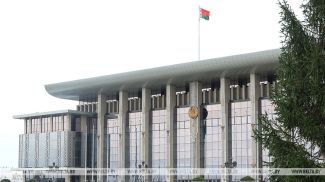MINSK, 8 June (BelTA) – Belarus President Aleksandr Lukashenko has signed the Law on Amendments to Codes on Criminal Responsibility. The document, which was previously adopted by the House of Representatives and approved by the Council of the Republic, has been published on the National Legal Internet Portal, BelTA informs.
The Law on Amendments to Codes on Criminal Responsibility seeks a comprehensive overhaul of criminal law.
This document has refined the provisions of the General Part of the Criminal Code. In particular, it specifies the conditions when the provision on the Excessive Use of Force in Self-Defense cannot be applied (if a person, due to unexpectedness of an aggression, could not objectively assess its danger and essence). The new law offers a more differentiated approach to giving a fine (depending on specific circumstances of a crime and the personality of the offender), and a possibility of its payment by installments.
If a convict is subject to a punishment other than incarceration but evades it, this punishment will be replaced by a more severe one. The corresponding decision will be made by court.
The new law revises the scale of punishment for about 70 offenses in the Special Part of the Criminal Code. As a result, the punishment will be fully commensurate with the nature of a crime and degree of its social danger.
In a number of articles (coercion to commit a transaction, fraud and other crimes against property and the procedure for carrying out economic activities), restriction of freedom will be used as an alternative to imprisonment. This will allow courts to be more flexible in sentencing.
Certain articles and corpus delicti were removed for being formalistic (for example, violation of safety rules while handling genetically engineered organisms that did not cause harm to human health and the environment). The same pertains to articles and corpus delicti punishable by other measures (for example, harm caused to the environment as a result of breaching the rules of water use, rules for the protection of fish and other aquatic animals is reimbursed in accordance with the established rates, therefore, criminal liability is unnecessary). In addition, those articles and corpus delicti that are not grave in nature and provide for an administrative collateral estoppel are also excluded from the codes of criminal responsibility.
Along with introducing a more lenient responsibility for certain wrongdoings, the law offers additional protection for the country's constitutional order. To this end, a number of new articles and new corpus delicti were included in the Criminal Code. One of them is extremism (being member of an extremist group and providing assistance to extremist activities, training to participate in such activities), as well as repeated violation of the law on mass events (in this case, criminal responsibility will arise in the event of a double administrative collateral estoppel). Liability was introduced for the distribution of prohibited information by the owner of an Internet resource, if it was done within a year after the owner was brought to administrative responsibility. Liability was also introduced for the illegal collection and distribution of personal data, failure to comply with the requirements for their protection. The same applies to illegal collection or receipt of information constituting state secrets with the aim of disseminating them (in the absence of signs of treason or espionage).
At the same time, the responsibility for the murder of a member of the police was toughened (similar responsibility was introduced for the murder of a military man/woman), resistance to persons protecting public order, for violence or the threat of using violence against such persons, as well as judges and people's assessors, for public insult to a government official for their performance of official duties or to their relatives, preparations for actions that grossly violate public order or participation in them, public calls for illegal mass events, deliberate blocking of transport resulting in significant damage (40 or more base amounts).
The responsibility for other criminal acts was fine-tuned. Chapter 31 “Cybercrimes” of the Criminal Code was revised. The responsibility for tax evasion was significantly toughened. The maximum sentence for such an act was increased from 3 to 7 years if it caused significant damage, and from 7 to 12 years if it caused exceptionally significant damage.
In addition, the new law introduces a responsibility for evasion of duties of a tax agent, tax fraud and evasion of payment of insurance contributions to the social security fund.
Criminal responsibility was introduced for the production, import or sale of counterfeit medical products, as well as forgery of quality certificates, labeling of such medicines. This measure is aimed to prevent substandard drugs from entering the market.
The Criminal Procedure Code provides for the use of mediation mechanisms in criminal cases, expands the use of information technologies in criminal proceedings. For example, it provides for a possibility of performing certain investigative actions, like interrogation, through the internet. The role of the prosecutor's office was strengthened. The prosecutor general, his/her deputies, as well as prosecutors of the regions and Minsk are empowered to issue orders that will be binding for criminal prosecution authorities and to transfer statements (reports) about crimes from one body to another.
The Criminal Execution Code was also amended following the introduction of amendments to the Criminal Code and the Criminal Procedure Code. The amendments to the Criminal Execution Code clarify the procedure for giving parcels and money transfers to convicts and making telephone calls by them (in particular, convicts were given an opportunity to make video calls).
The main provisions of the law will come into force three months after its official publication.













